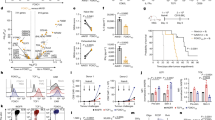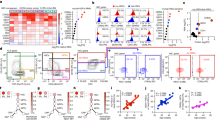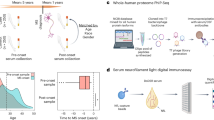Abstract
Rheumatoid arthritis (RA), which afflicts about 1% of the world population, is a chronic systemic inflammatory disease of unknown aetiology that primarily affects the synovial membranes of multiple joints1,2,3. Although CD4+ T cells seem to be the prime mediators of RA, it remains unclear how arthritogenic CD4+ T cells are generated and activated1,2,3. Given that highly self-reactive T-cell clones are deleted during normal T-cell development in the thymus, abnormality in T-cell selection has been suspected as one cause of autoimmune disease4,5. Here we show that a spontaneous point mutation of the gene encoding an SH2 domain of ZAP-70, a key signal transduction molecule in T cells6, causes chronic autoimmune arthritis in mice that resembles human RA in many aspects. Altered signal transduction from T-cell antigen receptor through the aberrant ZAP-70 changes the thresholds of T cells to thymic selection, leading to the positive selection of otherwise negatively selected autoimmune T cells. Thymic production of arthritogenic T cells due to a genetically determined selection shift of the T-cell repertoire towards high self-reactivity might also be crucial to the development of disease in a subset of patients with RA.
This is a preview of subscription content, access via your institution
Access options
Subscribe to this journal
Receive 51 print issues and online access
$199.00 per year
only $3.90 per issue
Buy this article
- Purchase on Springer Link
- Instant access to full article PDF
Prices may be subject to local taxes which are calculated during checkout




Similar content being viewed by others
References
Harris, E. D. Rheumatoid Arthritis (W. B. Saunders, Philadelphia, 1997)
Feldmann, M., Brennan, F. M. & Maini, R. N. Rheumatoid arthritis. Cell 85, 307–310 (1996)
Firestein, G. F. in Textbook of Rheumatology 5th edn (eds Kelley, W. N., Ruddy, S., Harris, E. D. & Sledge, C. B.) 851–897 (W. B. Saunders, Philadelphia, 1997)
Marrack, P., Kappler, J. & Kotzin, B. L. Autoimmune disease: why and where it occurs. Nature Med. 7, 899–905 (2001)
von Boehmer, H. et al. Thymic selection revisited: how essential is it? Immunol. Rev. 191, 62–78 (2003)
Chan, A. C., Iwashima, M., Turck, C. W. & Weiss, A. ZAP-70: a 70 kd protein-tyrosine kinase that associates with the TCR zeta chain. Cell 71, 649–662 (1992)
Sakaguchi, S. & Sakaguchi, N. Thymus and autoimmunity: capacity of the normal thymus to produce pathogenic self-reactive T cells and conditions required for their induction of autoimmune disease. J. Exp. Med. 172, 537–545 (1990)
Itoh, M. et al. Thymus and autoimmunity: production of CD25+ CD4+ naturally anergic and suppressive T cells as a key function of the thymus in maintaining immunologic self-tolerance. J. Immunol. 162, 5317–5326 (1999)
Negishi, I. et al. Essential role for ZAP-70 in both positive and negative selection of thymocytes. Nature 376, 435–438 (1995)
van Oers, N. S. et al. The 21- and 23-kD forms of TCR zeta are generated by specific ITAM phosphorylations. Nature Immunol. 1, 322–328 (2000)
Iwashima, M. et al. Sequential interactions of the TCR with two distinct cytoplasmic tyrosine kinases. Science 263, 1136–1139 (1994)
Zhang, W., Sloan-Lancaster, J., Kitchen, J., Trible, R. P. & Samelson, L. E. LAT: the ZAP-70 tyrosine kinase substrate that links T cell receptor to cellular activation. Cell 92, 83–92 (1998)
Rincon, M. MAP-kinase signaling pathway in T cells. Curr. Opin. Immunol. 13, 339–345 (2001)
Noraz, N. et al. Alternative antigen receptor (TCR) signaling in T cells derived from ZAP-70-deficient patients expressing high levels of Syk. J. Biol. Chem. 275, 15832–15838 (2000)
Murphy, K. M., Heimberger, A. B. & Loh, D. Y. Induction by antigen of intrathymic apoptosis of CD4+CD8+TCRlo thymocytes in vivo. Science 250, 1720–1723 (1990)
Kisielow, P., Bluthmann, H., Staerz, U. D., Steinmetz, M. & von Boehmer, H. Tolerance in T-cell-receptor transgenic mice involves deletion of nonmature CD4+8+ thymocytes. Nature 333, 742–746 (1988)
Kisielow, P., Teh, H. S., Bluthmann, H. & von Boehmer, H. Positive selection of antigen-specific T cells in thymus by restricting MHC molecules. Nature 335, 730–733 (1988)
Wiest, D. L. et al. A spontaneously arising mutation in the DLAARN motif of murine ZAP-70 abrogates kinase activity and arrests thymocyte development. Immunity 6, 663–671 (1997)
Sakaguchi, S., Sakaguchi, N., Asano, M., Itoh, M. & Toda, M. Immunologic self-tolerance maintained by activated T cells expressing IL-2 receptor α-chains (CD25). Breakdown of a single mechanism of self-tolerance causes various autoimmune diseases. J. Immunol. 155, 1151–1164 (1995)
Keffer, J. et al. Transgenic mice expressing human tumor necrosis factor: a predictive genetic model of arthritis. EMBO J. 10, 4025–4031 (1991)
Kouskoff, V. et al. Organ-specific disease provoked by systemic autoimmunity. Cell 87, 811–822 (1996)
Pals, S. T., Radaszkiewicz, T., Roozendaal, L. & Gleichman, E. Chronic progressive polyarthritis and other symptoms of collagen vascular disease induced by graft-versus-host reaction. J. Immunol. 134, 1475–1482 (1985)
Nishimura, H., Nose, M., Hiai, H., Minato, N. & Honjo, T. Development of lupus-like autoimmune diseases by disruption of the PD-1 gene encoding an ITIM motif-carrying immunoreceptor. Immunity 11, 141–151 (1999)
Horai, R. et al. Development of chronic inflammatory arthropathy resembling rheumatoid arthritis in interleukin 1 receptor antagonist-deficient mice. J. Exp. Med. 191, 313–320 (2000)
Atsumi, T. et al. A point mutation of Tyr-759 in interleukin 6 family cytokine receptor subunit gp130 causes autoimmune arthritis. J. Exp. Med. 196, 979–990 (2002)
Dayer, J. M. & Burger, D. Cytokines and direct cell contact in synovitis: relevance to therapeutic intervention. Arthritis Res. 1, 17–20 (1999)
Naka, T., Nishimoto, N. & Kishimoto, T. The paradigm of IL-6: from basic science to medicine. Arthritis Res. 4(Suppl. 3), S233–S242 (2002)
Werlen, G., Hausmann, B., Naeher, D. & Palmer, E. Signaling life and death in the thymus: timing is everything. Science 299, 1859–1863 (2003)
Nambiar, M. P. et al. T cell signalling abnormalities in systemic lupus erythematosus are associated with increased mutations/polymorphisms and splice variants of T cell receptor zeta chain messenger RNA. Arthritis Rheum. 44, 1336–1350 (2001)
Takeuchi, T. et al. TCR zeta chain lacking exon 7 in two patients with systemic lupus erythematosus. Int. Immunol. 10, 911–921 (1998)
Acknowledgements
We thank H. von Boemer for transgenic mice; M. Singh (GBF, Germany) for a gift of recombinant HSP-70 through the support of the UNDP/World Bank/WHO Special Program for Research and Training on Tropical Diseases; F. Melchers, R. Zinkernagel, K. Yamamoto, R. Suzuki and Z. Fehervari for discussion; A. Kosugi and T. Nakayama for reagents; and E. Moriizumi for immunohistochemistry and histology. This work was supported by grants-in-aid from the Ministry of Education, Science, Sports and Culture, the Ministry of Human Welfare, Japan Science and Technology Corporation, and the Organization for Pharmaceutical Safety and Research of Japan. Authors' contributions. The SKG strain was established by S.S. and N.S. The experiments in Figs 1, 2a–d, 3f–h, 4, Supplementary Figs 1, 4 and 6 were conducted by N.S. and S.S.; those in Fig. 2b–d by Ta.T., N.S., H.H., To.T., S.Y., T. S., S.N. and S.S.; those in Figs 2e, f, 3a–c, e and Supplementary Fig. 2 by Ta.T.; that in Fig. 3d by To.T.; that in Supplementary Fig. 3 by T.N., and that in Supplementary Fig. 5 by T.M. ZAP-70-deficient mice were provided by I.N.
Author information
Authors and Affiliations
Corresponding author
Ethics declarations
Competing interests
The authors declare that they have no competing financial interests.
Rights and permissions
About this article
Cite this article
Sakaguchi, N., Takahashi, T., Hata, H. et al. Altered thymic T-cell selection due to a mutation of the ZAP-70 gene causes autoimmune arthritis in mice. Nature 426, 454–460 (2003). https://doi.org/10.1038/nature02119
Received:
Accepted:
Issue Date:
DOI: https://doi.org/10.1038/nature02119
This article is cited by
-
Immune tolerance of citrullinated peptides
Nature Reviews Rheumatology (2024)
-
The complement factor H-related protein-5 (CFHR5) exacerbates pathological bone formation in ankylosing spondylitis
Journal of Molecular Medicine (2024)
-
Increased gut permeability and intestinal inflammation precede arthritis onset in the adjuvant-induced model of arthritis
Arthritis Research & Therapy (2023)
-
A novel Anti-ROS osteoblast-specific delivery system for ankylosing spondylitis treatment via suppression of both inflammation and pathological new bone formation
Journal of Nanobiotechnology (2023)
-
Gateway reflexes describe novel neuro-immune communications that establish immune cell gateways at specific vessels
Bioelectronic Medicine (2023)
Comments
By submitting a comment you agree to abide by our Terms and Community Guidelines. If you find something abusive or that does not comply with our terms or guidelines please flag it as inappropriate.



